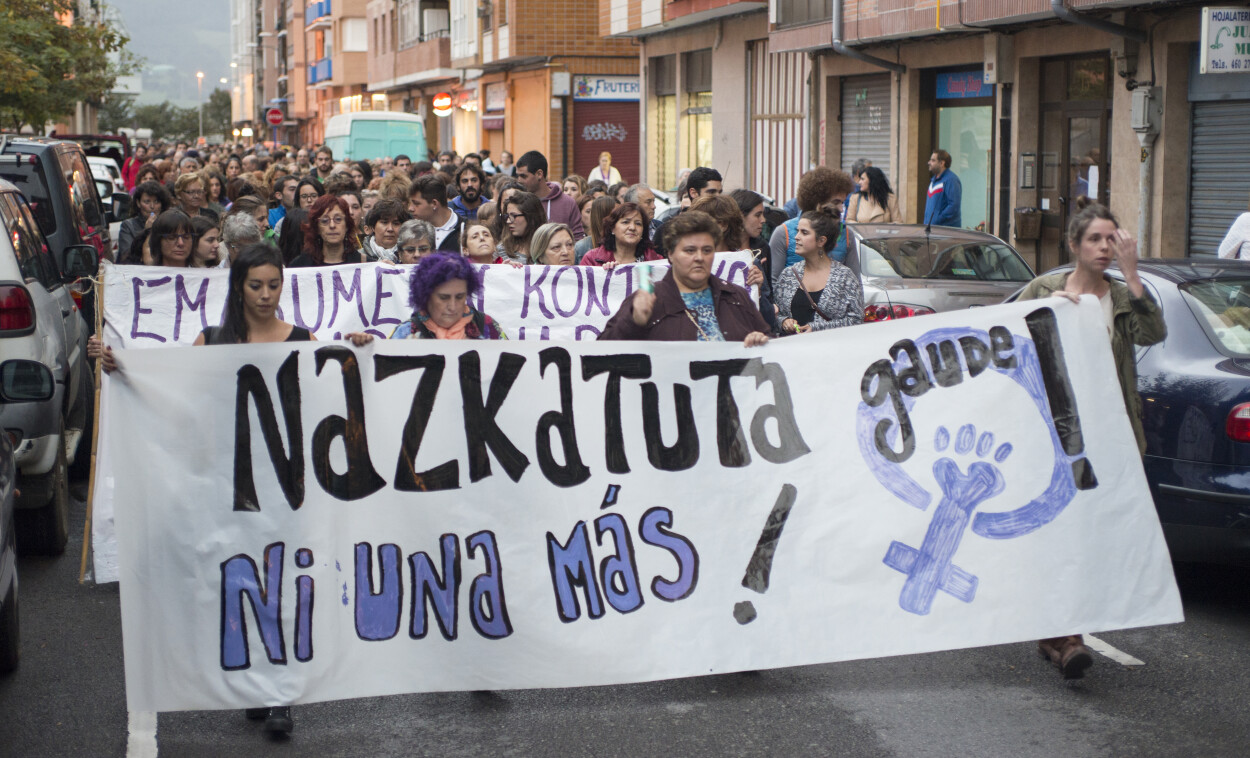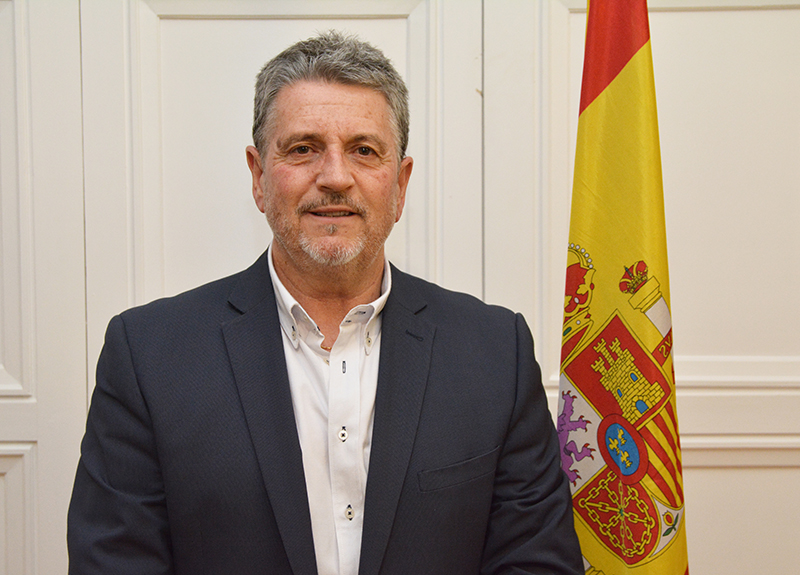"In this 50 I haven't enjoyed it so much, I've even suffered."
- The title of Patxi Zubizarreta's new novel is the number: 50. The author has put three artists of this age on the road to Panticosa (Huesca), among whom the recital “A Gift Forest” stands out. A journey that, on the front page, saves a life in the heart, reflections of Zubizarreta and, perhaps, his fellow travellers.
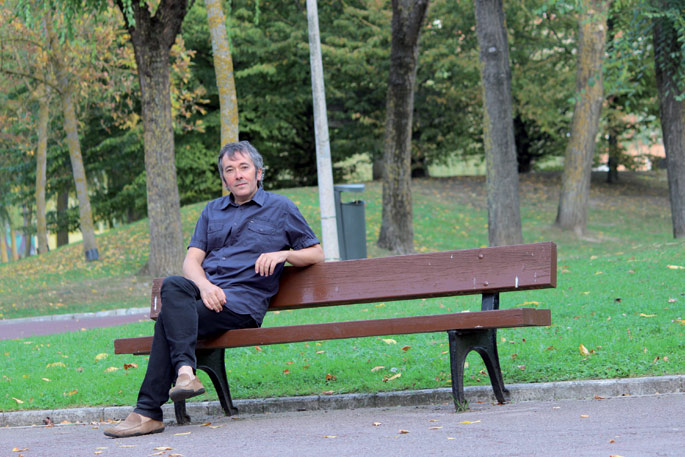
On one occasion Asun Balzola told us that 50 years is not just any age, that it is a limit…
The other day Maddalen Iriarte laughed at me because in the Azpimarra series I said that Osakidetza's letter, from the tests, caused me discomfort. On the other hand, there is also a 50 signal on the road: Stop! I clearly saw that 50 excuses for rethinking things was a good excuse. It was a gesture from the spa. And besides the number is 50, there are no letters, and when it comes to putting the title to our works there is always work. Finally, Gerardo Markuleta translated 14, Jean Echenoz's novel, and I also decided to play around. To the editor of the txalaparta, Mikel Soto, I have no doubt that I made the proposal of the title, 50, and the name of the action that the characters do: A gift glass. 50 excuses, but more than that: on the one hand, the physical tiredness that accompanies age; on the other hand, psychic tiredness, because a novel requires a huge effort. Sometimes I wondered if I would be left behind.
Behind?
I would feel able to do a great job. I have a vortex of thought that I can't explain very well, that I don't care either -- I'd rather move forward -- but there's something there. A novel contains some of Hercules' works.
50 km per hour…
Yes and no. On the one hand, I like slowness; on the other, I feel the need to break the border. They have taught us to abide faithfully by the rules, they have educated us closely, they have forced us to comply with all the rules and limits. And you should plant yourself from time to time.
You have excused yourself to rethink things. “Things,” is life…
Yes, life. I really like Xuan Bello, her work is enviable, but I'm also aware that this kind of literature is very elitist. As in Emak Bakia, those of us who get sick with the death of words know what that is. Xuan Bello said that it was curious the work of the person who collects in his notebook facts, colors, faces, emotions… And, indeed, it is curious! When I was young, they said to me: “Get a fixed position and then write in your spare time!” For a while I worked as a professor at Kanbo, and I realized that it was impossible for me to get home and write: I was exhausted at Baiona Ttipi. Even when I was young, I picked up some literary prize, I advanced and I made an exhilarating bet: to be a writer. With the crisis, it begins to rethink those decisions of the pleistocene!
He has used a thousand themes, and one more. Among other things, about the profession of the writer, a prize, another editor... He has counted as many, or more, thorns as roses.
I'm glad I found an accomplice editorial, because today the people in the editor are hardly encouraged to publish this kind of work. It should be the other way around. Technically, it's nothing extraordinary to publish a book and a CD, but time is very intense -- I'm lonely, very, very, but I also need people, and I really appreciate the company. The complicity, as far as the editor is concerned, as regards the people who are going to read the text, seems to me to be a vacuum. Because loneliness doesn't always like it.
Is there an editor who fills that gap with the writer?
I don't think so. I also suspect that the artist sometimes lies. They tell him what he wants to hear and hide what he doesn't want to hear. I, on the contrary, despite each other’s diplomacy, would like to have a real dialogue, a communication. But it's getting harder and harder, we live very dispersed, instead of doing this and that, and I'd like to be here and now, in this interview, and not in the mandates or the calls that I have to make in an hour's time. I think we're in this society, even if we're at rest. Publishers have been affected by the large incidences that have occurred. I have had the support of Alberdania, the illusion, the project… but today it is not. The Basque editors I have met have always been there, they have always been there. You just have to go to the Durango Fair: the faces of always. In Madrid and Barcelona I have not seen anything similar, there the editors have fallen one after the other: Since I started publishing in Spain, and among those I met, it only goes on! Strong, even wise, strong editors have fallen in a very ugly way! In Euskal Herria, we're there, even though we're moving, and each of us makes its own donkey. I'm missing my mime, that's right.
The reader will believe that we are
aging… And it’s true! Ajajajajajajajajajajajajajajajajajajajajajajajajajajajajajajajajajajajajajajajajajajajajajajajajajajajajajajajajajajajajajajajajajajajajajajajajajajajajajajajajajajajajajajajajajajajajajajajajajajajajajajajajajajajajajajajajajajajajajajajajajajajajajajajajajajajajajajajajajajajajajajajajajajajajajajajajajajajajajajajajajajajajajajajajajajajajajajajajajajajajajajajajajajajajajajajajajajajajajajajajajajajajajajajajajajajajajajajajajajajajajajajajajajajajajajajajajajajajajajajajajajajajajajajajajajajajajajajajajajajajajajajajajajajajajajajajajajajajajajajajajajajajajajajajajajajajajajajajajajaj
That the young man will walk his way, together with the old and new editors...
Yes, yes… I think over time we increasingly appreciate the little things around us, those people who love us, those we love… I do it without drama. When artists start to cry, it's over! How many regrets, how many rapsodas!
50, however, does not cry…
At least, I wouldn't like it. I want to continue enjoying, although sometimes it costs me. I want that young man who made the decision to write, who will present his work with enthusiasm in this or that editorial, who will try, who will not succeed... That is what I would like.
The first book by Jose Enrike Urrutia Capeau is entitled Kadrila alegera festan… The crew of this book also has its name there, of allegera, of crazy, of fiesta…
Those joyful and crazy moments bring us together. Then comes the physical, aesthetic, ideological unrest, but in the meantime we're always there. And it’s enough to see each other to remember that night or that conversation, when we said what we didn’t have to say… That’s what surrounds us. In that sense, people of artists are so… so pathetic, so human, so good to be protagonists! Sometimes we pride ourselves, but we also know how to walk at deep levels.
Three friends, three artists – writer, pianist, sculptor – on the road to Panticosa (Huesca, Spain), a performance. A fourth character – the painter – died, completely present in the novel. What message does that skin have?
Obviously, the journey itself is not an objective. Otherwise, North America or Morocco would be more exotic. In this sense, going to Panticosa is nothing exotic. Sometimes, in the Pyrenees you hear much more Basque than in many places in the Basque Country! Three people travel by van, and the van is a closed space, and Panticosa is also a small, closed space amidst the grandeur of the Pyrenees. Very beautiful, but collected. This provided me with a very friendly atmosphere to make statements: travel is always an excuse to communicate. I have the impression that in this work my intention was to do the work together. Bilana, as they say in Iparralde. “This is my life so far, this is my little thing, that of my elders.” Put my life in the step, reflect and rethink it: from now on what. “We were friends but we didn’t pay a tribute. We have to get together more.”
Life, death, sex, love and relationships, Euskal Herria, conflict... whatever you want, in six chapters, divided into four or five sections, each in a constant line: your readings, experiences, visions and memories between friends, a recital of a forest of gifts always at the end...
Mikel Soto would call him an artifact. I've found that when big ships or oil tankers get older, they go underground and start dismantling. It is said that it is crushed in pieces of human size, starting with the bow and the stern at the same time. It is estimated that they consist of about one million pieces and that they need a year. The more the boat dismantles, the more monstrous the skeleton is. In the end, the large pieces are removed and there is a piece of the size of a book: it is called a soul, and the workers are looking at it silently, as in prayer. I, too, in a similar way, have worked removing myself from here and there, until I leave my soul: this book is the soul, naked, disguised, longed … And the album is like the heads of the jibaros, further reduced.
In the book, Euskal Herria and the conflict, and Ortega Lara and Delclaux, and the Civil Guard… These are not strange issues.
I cannot forget the day Buesa and Díez were killed. From the house we heard the shot, the newborn, taking his mother's chest, and whoa! It had to be about two kilometers away from home, but anyway! And also in Ordizia, how many attacks, how many sufferings everywhere. And the Civil Guard, in the Plaza de Ordizia, in the assembly… What we lived with great enthusiasm, has become a great pain. Greater for some than for others. I believe that the relief we have received – three years after the cessation of ETA’s weapons – has not been properly celebrated, that we are not explaining the joy properly. Now the protagonists are the Catalans! I believe that our People are also on a pause, rather than defining it, rather than rethinking it. I think that, from our situation, we have a good opportunity to do things right, even if it's very burned, it's very smelly. It is time to make a hopeful and compatible project. Perhaps we are not aware of the importance of this historic moment. Go up the mountain, and I see where we live, and I say, "This deserves it!" Even if it is only for those who left and for those we love, this People is worthwhile, life is worth it.
Strange and strange reflection about religion even when it is not on the “agenda”!
I remember the unbearable lightness of the Existence of Milan Kundera… By the way, I presented myself to the call to return it, although I did not win it, but I would have liked to return it. How many crappings on your intimate resume! The unbearable lightness of existence, and today, on the contrary, the “unbearable lightness of sex” – or portable, I don’t know – we should say. We, first of all, live on the opposite end. Religion stays there: soul, being… It is also scary to mention it. Young people: “But this is what it is all about!” But these are questions we always ask, questions we always ask. We are experiencing a change of time, and I agree with that statement. The Church also has to offer another discourse, another theology, and literature too!
“Also literature”…
Yes. Literature is another form of theology: to look at the world, to look at heaven, paradise, that the protagonists are small gods… I suspect that we are all waiting for a new discourse, that we are repeating an old discourse… In the case of the Church, it is clear. And also in the case of literature.
First, as far as literature is concerned, some of his apostles appear in the book: Daniel Kehlman, Arnold Bennet, Rosa Montero…
But my apostles live as lost as me! I couldn't get a lot of light out there!
And although you did not have the opportunity to return to Kunde, in this 50 you have brought to the Basque some excerpts of authors you like…
Yes! I also make a sentimental dedication to the reader who approaches this book: “These are my readings. Let’s see if you also enjoy, with my little adaptation.” But at least I gave some references, some books, some authors, because my real work, the real pleasure, is reading together with writing. Now I'm with The Rampant Baron of Italo Calvino and the Orixe Santa Kruz priest of a long time ago. And now, in the presentations of this 50, from here to there, I've taken the time to read about Orixe, his style, his music...
Pending a diagnosis of critical sensations, some readers say you've squeezed one, two, three. Have you realised that?
I am not aware of that. I remember that the style kept by Bernardo Atxaga’s book Obabakoak was a real astonishment for me. The reader can be aware of this and that, while I seek, and I think it should be like this. Like Beckett's phrase, tattooed on the left arm by Tennis player Warinka: “Fallad, fallad again, but fallad better.” I am encouraged by that. In my process, I see Joan more limited: the story of the sick doctor, the joy of writing… In this 50 I have not enjoyed it so much; I have even suffered, because I have greatly expanded the range, I have involved a lot of people and, in the end, I was tired to write. Fortunately, I am not aware of this, and better! I want to continue searching, that motivates me, for the following texts.
Looking for…
I told Joserra Senperena. Take the album Mandarin dotore – good work! – and it gives me the illusion of following the opposite path until now, that is, to take the melody and write in me what it ignites, without haste, without the need for a book, with the feeling of losing time, as Denbora galdutako alde, Bitoriano Gandiaga wrote. Wonderful book, product of a pathology! We are all more or less sick, and this People has nothing to say.
Tell me about your squads, of which you have already been your partner. The CD A gift forest that accompanies the book highlights your complicity...
I really am an accomplice. Joserra Senperena, always ready to work and always exciting her work! Maddi [Oihenart], same thing. The novel also asks what music we want to die after dying more than we would like, with what music we want to die with. The other day, they asked me if I had thought about it, too. And not. But I have some, Maite dut, maite, or They'll see you again -- these are songs that excite me every time. I put them on a lot of times. Of course, at home, I'm told to put Van Morrison, and I love to put him, because I like him. Maddi Oihenart, too. They're their old accomplices. The news, in any case, is Mintxo Cemilla: I saw his work in Vitoria, in the bar, in the movies, on the roof of a monk convent now… Multifaceted, I really like his work. That's a novelty. The voice of Martin Tejeria in “The Poor Doctor”. I was fascinated! Gorgeous aesthetic orgasm. Gift of the little moments. Joserra, Maddi, Mintxo… And Oihane Igerabide, Rafa Berrio, or Antton Valverde! It would never have occurred to me! Say yes! The humility of Valverde! n
FERMIN MUGURUZA 40. ANNIVERSARY
When: 21 December.
Where: Bilbao in the Arena.
-------------------------------------------
Every year Bilbao will be on the 21st of December. The cider and talo, protagonists of the day, is the day of the fair of St. Thomas. This year,... [+]
Goldatz talde feministak antolatua, ortziralean, urtarrilaren 3an, Jantzari dokumentala proiektatuko dute Beralandetan (17:30ean) eta biharamunean, urtarrilaren 4an, Berako bestetako tradizioak aztergai izanen dituzte Maggie Bullen antropologoarekin leku berean (10:30).









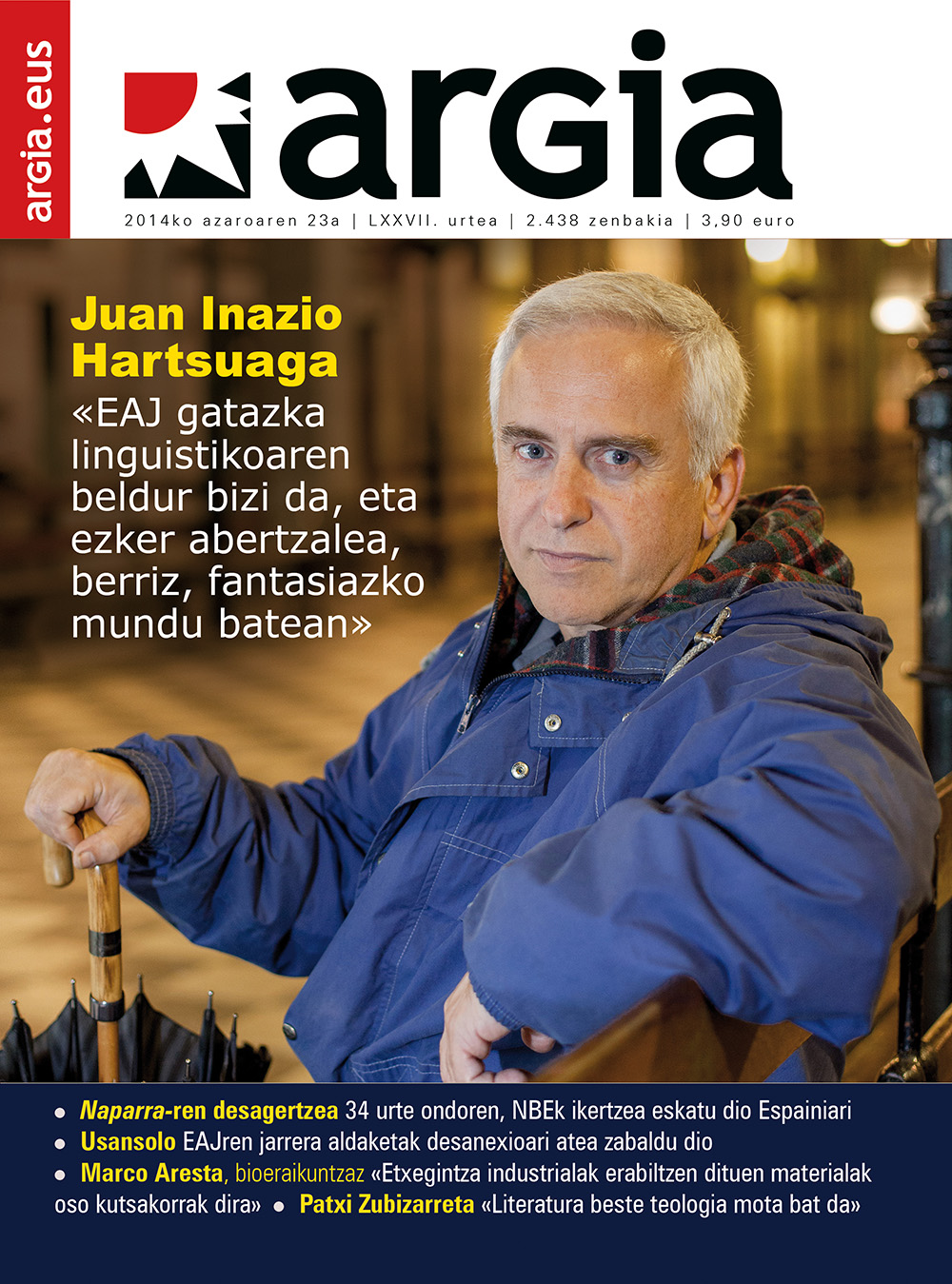

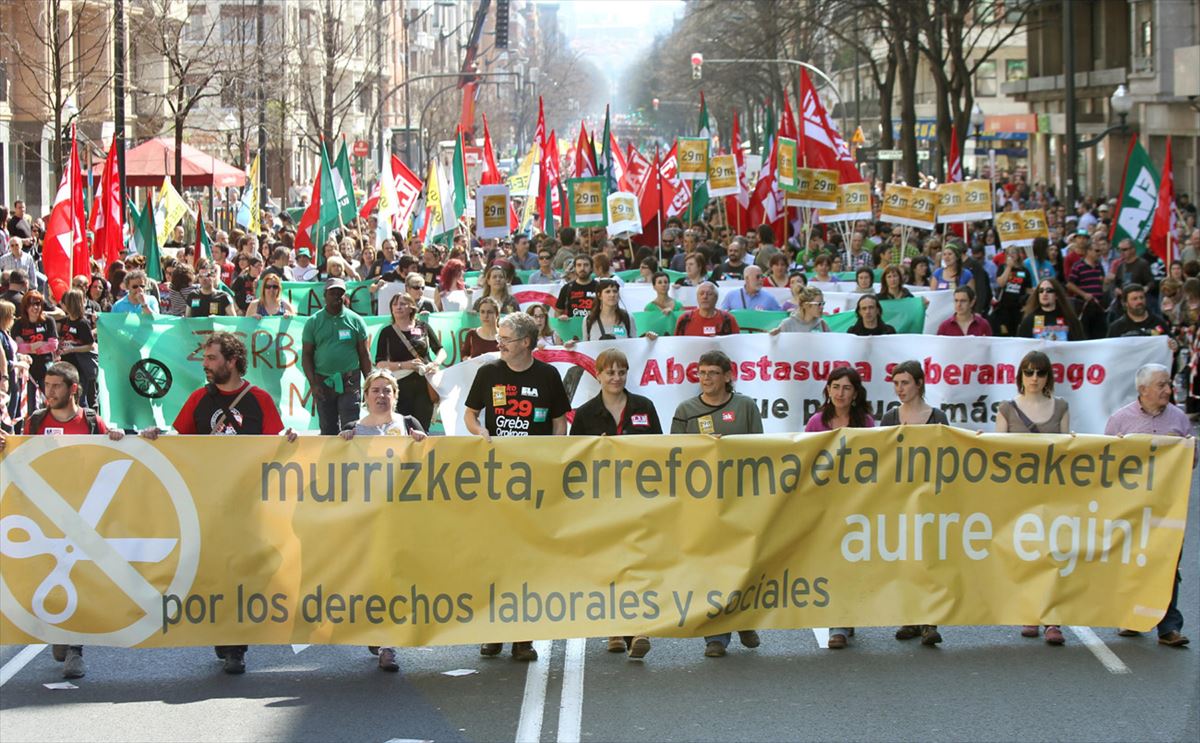
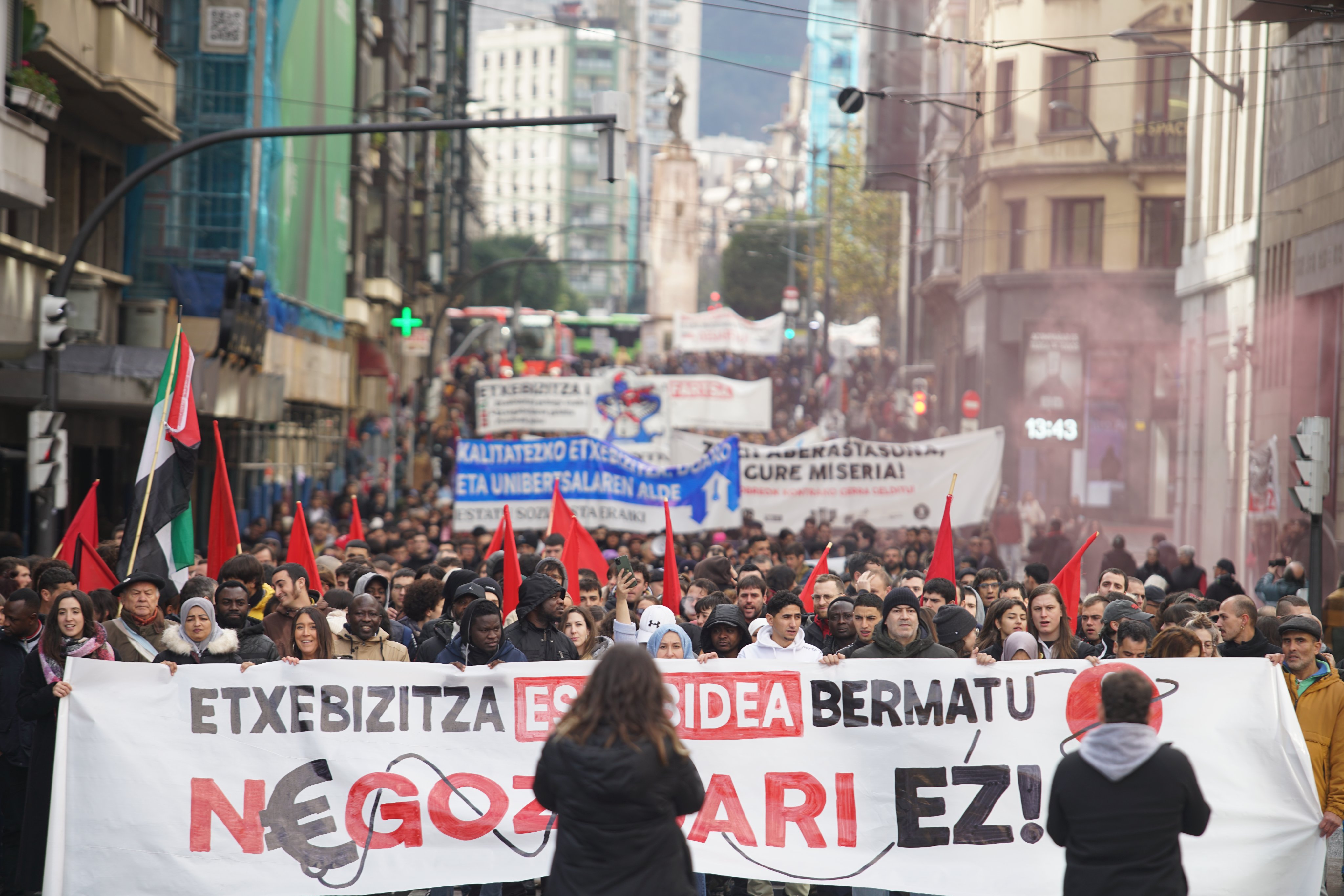



.jpg)

